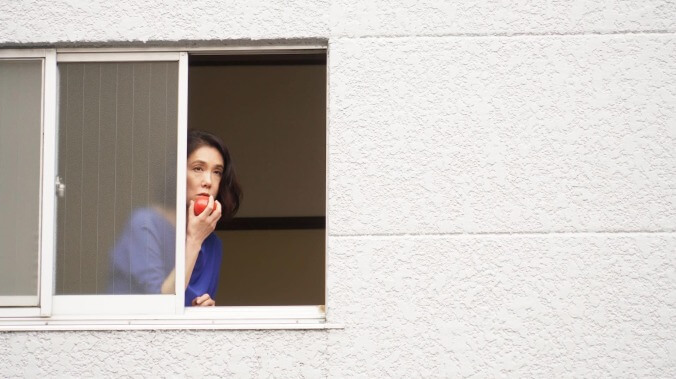The engrossing puzzle-box thriller A Girl Missing loses sight of its pieces
Film Reviews Movie Review

A Girl Missing is a movie about optics—how bad ones can incriminate an innocent person, and how we perceive each other, and ourselves, through shattered lenses. Japanese writer-director Kôji Fukada broaches these ideas through an unsettling catalyst: a kidnapping shrouded in mystery, though not the mystery you’d expect. Many questions remain unanswered, and Fukada’s commitment to ambiguity creates an air of cool, eerie detachment that pulls you into its gravitational field. At the same time, though, A Girl Missing feels torn between a slippery character study and a social thriller, and it suffers from the absence of the puzzle pieces it declines to reveal.
The film opens with a makeover. Risa (Mariko Tsutsui), a middle-aged woman with a knowing expression, tells hairdresser Kazumichi (Sōsuke Ikematsu) that she needs a change—a chop and a burgundy dye job. From here, the story unfolds across two interweaving timelines, pre-haircut and post. In the present, Risa lives in an unkempt apartment across the street from Kazumichi, whom she spies on from her window. There’s something quietly unsettling about this woman; she strikes a friendship with the young man in a manner that feels too measured, like her smile. Her mysterious persona contrasts with the Risa of the past, a kindly nurse to an aging, bed-ridden artist, and a mentor to her patient’s two granddaughters, chirpy school-girl Saki (Miyu Ogawa) and sullen university student Motoko (Mikako Ichikawa). This Risa, staid and pleasant, is nothing like the tortured one from the other timeline, whose private behavior is distressing and increasingly absurd. (When she spontaneously breaks into a fit of barking, the effect is practically Lanthimosian.)
Risa, it turns out, is actually Ichiko. So why the name change, and the new look, and the radical change of identity? The answer at first seems to be bad luck. Saki is kidnapped by Ichiko’s disturbed nephew, Tatsuo (Ren Sudo), right after he is introduced to the girls at a coffee shop. Saki later turns up unharmed, but Tatsuo’s actions have lingering effects. Though Ichiko is compelled to reveal to the girls’ mother her connection to the kidnapping, she’s convinced to remain silent by Motoko, whose affection for her is more than platonic. Nosy journalists eventually unearth the secret, though that proves less damning than a story about Ichiko’s past, recounted to the cameras by Motoko.
“Does someone who’s broken a family deserve a happy future?” the younger woman asks, her intentions duplicitous. It’s a question that Fukada also posed in his last film, Harmonium, another study of guilt and vengeance playing out in suburban, middle-class spaces, in unexpected and compelling ways. Prickly moral dilemmas fascinate the filmmaker, who’s more interested in examining the fallout from a hidden angle than answering his own questions head-on. Hapless Ichiko begins to crumble under the accusations leveled against her, yet her victimhood is complicated by the delicate circumstances and Motoko’s machinations. Meanwhile, her unhinged and exacting persona from the future timeline bleeds into the past. Was she ever to be trusted?
The film’s Japanese title, “Yokogao,” translates to “side profile,” which seems to describe the meaning behind its parallel structure: that identity is elusive and fractured. Yet the side profile is as much about the attention given to one half as it is about the built-in blind spot that eclipses the other. It’s no coincidence that Fukada fills the movie with obscured faces—Tatsuo’s by a glare in the window before he commits his crime, Mokoto’s by a distant floodlight during a late-night meeting with Ichiko—and activities that involve the observation of passive, indifferent objects, like a stroll through an art museum or a date at the zoo. Ichiko never registers Motoko’s adoring gaze or how the girl agonizes when she reveals that she’s engaged. Likewise, Kazumichi never really understands why this older woman so fervently pursues him.
As Ichiko/Risa, Tsutsui (a regular in Fukada’s work) expertly navigates the psychological twists and turns, yet the increasingly patchy script does her no favors, leaving some of her most provocative final scenes out to dry in a pseudo-profound no-man’s land. There’s no denying the seductive powers of A Girl Missing, which gestures at the rot beneath the surface of politesse in the way Japanese society deals with criminality and taboo. Yet Fukada loses sight of his own blind spots and his own intentions in the process.